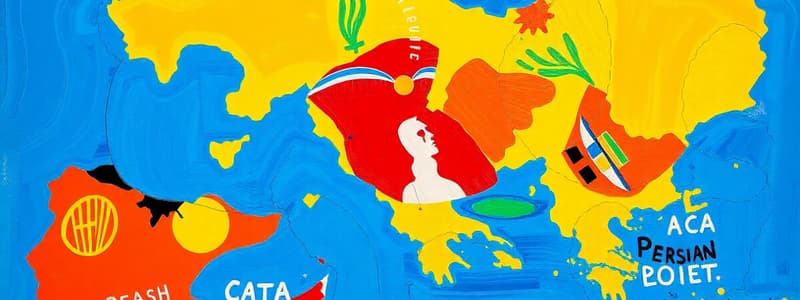Podcast
Questions and Answers
What was one major outcome of the Ionian Revolt regarding Greek city-states?
What was one major outcome of the Ionian Revolt regarding Greek city-states?
- It attracted the involvement of other Greek city-states, particularly Athens. (correct)
- It led to increased autonomy for Ionian city-states.
- It unified all Greek city-states against the Persians.
- It resulted in the complete withdrawal of Persian influence in the region.
How did the Persian response to the Ionian Revolt impact the region?
How did the Persian response to the Ionian Revolt impact the region?
- They strengthened their control by installing loyal rulers. (correct)
- They facilitated a new democratic system among the Ionian Greeks.
- They completely abandoned their interests in Ionia.
- They removed all local rulers and replaced them with Persian officials.
What did the Ionian Revolt reveal about Persian rule?
What did the Ionian Revolt reveal about Persian rule?
- It highlighted the desire for independence among the Ionian Greeks. (correct)
- It demonstrated the strengths of Persian military strategies.
- It indicated that the Persian Empire was expanding peacefully.
- It was widely accepted by the Ionian Greeks.
What significant role did Athens play after the Ionian Revolt?
What significant role did Athens play after the Ionian Revolt?
What long-term effect did the suppression of the Ionian Revolt have on the Ionian Greeks?
What long-term effect did the suppression of the Ionian Revolt have on the Ionian Greeks?
What was a primary motivation for the Ionian Revolt against Persian rule?
What was a primary motivation for the Ionian Revolt against Persian rule?
Who is recognized as a central figure in initiating the Ionian Revolt?
Who is recognized as a central figure in initiating the Ionian Revolt?
What event marked the beginning of the Ionian Revolt?
What event marked the beginning of the Ionian Revolt?
What was one consequence of the Ionian Revolt for the participating city-states?
What was one consequence of the Ionian Revolt for the participating city-states?
Which of the following best describes the Persian response to the Ionian Revolt?
Which of the following best describes the Persian response to the Ionian Revolt?
What significant role did Athenian support play in the Ionian Revolt?
What significant role did Athenian support play in the Ionian Revolt?
What internal issue in Ionian city-states contributed to the revolt?
What internal issue in Ionian city-states contributed to the revolt?
What was one outcome of the suppression of the Ionian Revolt?
What was one outcome of the suppression of the Ionian Revolt?
Flashcards
What was the Ionian Revolt?
What was the Ionian Revolt?
The Ionian Revolt was a rebellion of Greek city-states against Persian rule in the 6th century BC. It was a significant event that set the stage for the later Persian Wars.
What impact did the Ionian Revolt have on Greek-Persian relations?
What impact did the Ionian Revolt have on Greek-Persian relations?
The revolt highlighted the desire for independence among the Ionians and showcased the weaknesses of Persian governance.
How did the Ionian Revolt influence Athens's involvement?
How did the Ionian Revolt influence Athens's involvement?
The Ionian Revolt spurred Athenian involvement in the conflict, setting the stage for their crucial role in the Persian Wars.
What was the impact of the Ionian Revolt on the Ionian people?
What was the impact of the Ionian Revolt on the Ionian people?
Signup and view all the flashcards
What were the lasting consequences of the Ionian Revolt?
What were the lasting consequences of the Ionian Revolt?
Signup and view all the flashcards
Ionian Revolt
Ionian Revolt
Signup and view all the flashcards
Desire for Autonomy
Desire for Autonomy
Signup and view all the flashcards
Persian Oppression
Persian Oppression
Signup and view all the flashcards
Aristagoras: The Catalyst
Aristagoras: The Catalyst
Signup and view all the flashcards
Persian Counter-Attack
Persian Counter-Attack
Signup and view all the flashcards
Impact of the Revolt
Impact of the Revolt
Signup and view all the flashcards
Athenian and Eretrian Support
Athenian and Eretrian Support
Signup and view all the flashcards
Persian Satraps
Persian Satraps
Signup and view all the flashcards
Study Notes
Introduction to the Ionian Revolt
- The Ionian Revolt was a rebellion of Greek city-states (poleis) in Ionia (western coast of Anatolia) against Persian rule in the early 5th century BC.
- Motivations for the revolt included resentment of Persian rule, desire for greater autonomy, and possible instigation by Athenian and other Greek support.
Causes of the Ionian Revolt
- Persian rule, while initially tolerable, grew increasingly oppressive, including heavy taxation, interference in local affairs, and demands for tribute.
- Tyranny and oppression by Persian-appointed local governors (tyrants/satraps) further fueled resentment.
- The desire for self-governance and the restoration of democracy amongst the Ionians was a key motivation.
- The Persians increasingly interfered in the internal politics and governance of the Ionian city-states.
- Potential instigation by Athens, due to their growing power and influence in the Greek world, played a significant role in encouraging the revolt.
Key Figures in the Ionian Revolt
- Aristagoras, tyrant of Miletus, is widely considered a central figure in initiating the revolt. His ambitious aims and volatile character were critical to the outbreak.
- Various other Ionian leaders and citizens participated, uniting against the perceived injustice of Persian rule.
- Important figures such as Histiaeus (though his exact role remains debated and contested) potentially influenced the events leading up to the revolt.
Course of the Ionian Revolt
- The revolt commenced with an attack by the Ionians on Sardis, the Persian administrative centre in Lydia, in 499 BC.
- The initial success against the Persians was short-lived. A combined Persian response was swift and decisive.
- The Athenian and Eretrian involvement offered significant support to the initially successful Ionian forces until they were ultimately defeated.
Persian Response and Consequences
- The Persians launched a massive counter-attack against the rebels and their allies.
- Key cities like Miletus and other Ionian city-states were besieged and captured.
- The Persians inflicted significant destruction and suffered some losses during the counter-attack.
- The revolt was brutally suppressed. Ionian city-states that participated were punished severely.
- The suppression marked a turning point in the relationship between the Greeks and the Persians, as it foreshadowed further conflicts, including the subsequent Persian Wars.
Significance of the Ionian Revolt
- It had a lasting impact on the political landscape of the region and contributed significantly to the growing tensions and conflicts between Greece and Persia.
- The revolt is significant because it foreshadowed the larger conflict of the Persian Wars.
- The revolt ignited the attention and involvement of other Greek city-states in the conflict, most importantly Athens.
- It highlighted the rising power of Athens which led to their key, interventionary role in the subsequent conflicts.
- The revolt demonstrated the desire for independence among the Ionian Greeks and highlighted the shortcomings of Persian rule.
Aftermath of the Revolt
- The Persians installed loyal rulers and strengthened their control over the Ionian region.
- The suppression of the revolt led to further resentment amongst Ionian Greeks and further fueled the drive to resist Persian control.
- The revolt also resulted in changes of leadership, political upheaval, and reorganization in the Ionian city-states.
Studying That Suits You
Use AI to generate personalized quizzes and flashcards to suit your learning preferences.




